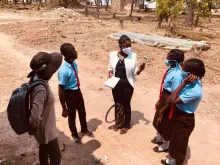Dora Chinmaya is a UN Volunteer Education Assistant serving with the UN Refugee Agency (UNHCR) in Zambia to improve access to quality education for refugees. Motivated by her passion for youth education, she is working for children to ensure equality, and a better life for refugees.
Forced to flee their homes due to persecution, conflict or violence, refugee children are five times more likely to be out of school than non-refugee children. Infrastructures set up to support refugee populations are often deemed to be temporary with the primary focus being to ensure that basic needs – such as food and shelter – are met
In refugee settlements, education is one area that is often under resourced. According to UNHCR, only 50 per cent of refugee children have access to primary school worldwide, only 22 per cent of refugee adolescents have access to lower secondary education, and only one per cent of refugees attend university.
Forced to flee their homes, refugee children often don’t have a school to go to. If there are schools nearby, they are often overcrowded and refugee children may not speak the language that is taught. --Missing Out: Refugee education in crisis, UNHCR
Education is key to enabling refugees to live a dignified and fulfilled life. Given the opportunity to learn and grow through education, despite incredible disruption and upheaval, there exists potential within each refugee to bring positive change and light to an otherwise dark world.
This stands true in the case of the Mantapala settlement schools.
UN Volunteer Dora Chinyama has been serving as an Education Assistant at the UNHCR Field Office in Kawambwa, working as part of the team ensuring refugees in Mantapala receive a quality education.
Since starting her assignment 14 months ago, one of Dora’s key tasks has been to undertake a desk review of the strengths, weakness, opportunities and risks of the education sector in the refugee settlement. By taking a community-driven approach to problem identification and solution design, Dora has worked with, and witnessed the growth and resilience of, refugees first-hand.
Additionally, Dora has devised an English Language Strategy to enable persons of concern in schools to acquire English language speaking and writing skills, which they need to integrate well into the national education system in Zambia.
Echoing Nelson Mandela, I’ve always believed that education is the great equalizer, and has the ability to draw people out of poverty and precarious situations, putting them in the driver’s seat of their own lives. Thus, my contribution to educating refugee children and youth has been nothing short of fulfilling. --Dora Chinyama, UN Volunteer Education Assistant with UNHCR, Zambia
Having devoted her career to working with NGOs focused on children’s access to education, Dora has always seen her role as being part of something that was bigger – a cause which can change lives and better humanity.
Her experience so far in contributing to quality education in settlement education has also spanned into ensuring coordination of the sector by being the focal point for engagement with partners and donors. Using the comprehensive refugee response framework, Dora has been able to see inclusiveness and diversity advance in the implementation of planned programs.
Education is an important first step towards normalcy in the lives of refugees. Seeing the transformative effect of education in the lives of Mantapalans is what drives UN Volunteers like Dora Chinyama and motivates them to do more and strive to be better.
As a UN Volunteer and someone who has always worked for children’s education, I feel proud to step up the effort and am driven to contribute to something bigger. Not only has being a UNV been rewarding and stretched my own personal growth, it offers me the chance to do even more of what I am passionate about. --Dora Chinyama

